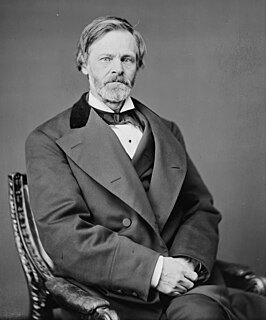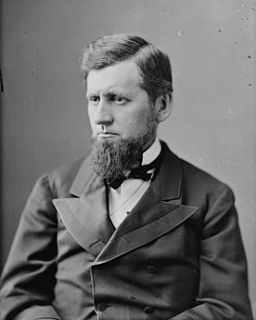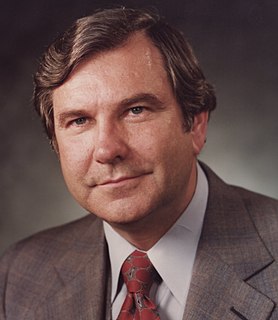Related Research Articles

Allen Granberry Thurman was a Democratic Representative, Ohio Supreme Court justice, and Senator from Ohio. He was the Democratic Party's nominee for Vice President of the United States in 1888. He ended up losing the election.
The following table indicates the party of elected officials in the U.S. state of Ohio:

The 53rd United States Congress was a meeting of the legislative branch of the United States federal government, consisting of the United States Senate and the United States House of Representatives. It met in Washington, D.C. from March 4, 1893, to March 4, 1895, during the first two years of Grover Cleveland's second presidency. The apportionment of seats in the House of Representatives was based on the Eleventh Census of the United States in 1890. Both chambers had a Democratic majority.

Samuel Clarke Pomeroy was a United States senator from Kansas in the mid-19th century. He served in the United States Senate during the American Civil War. Pomeroy also served in the Massachusetts House of Representatives. A Republican, he also was the mayor of Atchison, Kansas, from 1858 to 1859, the second president of the Atchison, Topeka and Santa Fe Railroad, and the first president to oversee any of the railroad's construction and operations. Pomeroy succeeded Cyrus K. Holliday as president of the railroad on January 13, 1864.

The 42nd United States Congress was a meeting of the legislative branch of the United States federal government, consisting of the United States Senate and the United States House of Representatives. It met in Washington, D.C. from March 4, 1871, to March 4, 1873, during the third and fourth years of Ulysses S. Grant's presidency. The apportionment of seats in the House of Representatives was based on the Eighth Census of the United States in 1860. Both chambers had a Republican majority.

The 54th United States Congress was a meeting of the legislative branch of the United States federal government, consisting of the United States Senate and the United States House of Representatives. It met in Washington, D.C. from March 4, 1895, to March 4, 1897, during the last two years of Grover Cleveland's presidency. The apportionment of seats in the House of Representatives was based on the Eleventh Census of the United States in 1890. The House had a Republican majority, and the Republicans were the largest party in the Senate.

In the United States Senate elections of 1912 and 1913, Democrats gained control of the Senate from the Republicans. Of the 32 seats up for election, 17 were won by Democrats, thereby gaining 4 seats from the Republicans. Two seats were unfilled by state legislators who failed to elect a new senator on time. They were the last Senate elections held before ratification of the 17th Amendment, which established direct elections for all seats in the Senate.

William Vincent Allen was an American jurist and twice a U.S. Senator from Nebraska.
The Massachusetts Republican Party (MassGOP) is the Massachusetts branch of the U.S. Republican Party.

The United States Senate elections of 1894 and 1895 were a slight Republican victory. It was a different story in the House where Democrats suffered massive losses. The senators elected went on to serve in the 54th Congress.

Martin Welker was a United States Representative from Ohio and a United States District Judge of the United States District Court for the Northern District of Ohio.

John McCain was the senior United States Senator from Arizona and 2008 Republican nominee for President of the United States. McCain was involved in many elections on local, statewide and nationwide stage since his first election to the United States House of Representatives in 1982.
The 1888 Republican National Convention was a presidential nominating convention held at the Auditorium Building in Chicago, Illinois, on June 19–25, 1888. It resulted in the nomination of former Senator Benjamin Harrison of Indiana for president and Levi P. Morton of New York, a former Representative and Minister to France, for vice president. During the convention, Frederick Douglass was invited to speak and became the first African-American to have his name put forward for a presidential nomination in a major party's roll call vote; he received one vote from Kentucky on the fourth ballot.

The United States Senate elections of 1902 and 1903 were elections in which the Democratic Party gained three seats in the United States Senate, but the Republicans kept their strong majority.
On January 12, 1898, the Ohio General Assembly met in joint convention to elect a United States Senator. The incumbent, Mark Hanna, had been appointed by Governor Asa Bushnell on March 5, 1897, to fill the vacancy caused by the resignation of John Sherman to become Secretary of State to President William McKinley. Hanna's appointment was only good until the legislature met and made its own choice. The legislature elected Hanna over his fellow Republican, Cleveland Mayor Robert McKisson, both for the remainder of Sherman's original term and for a full six-year term to conclude in 1905.

John Sherman was a politician from the U.S. state of Ohio during the American Civil War and into the late nineteenth century. A member of the Republican Party, he served in both houses of the U.S. Congress. He also served as Secretary of the Treasury and Secretary of State. Sherman sought the Republican presidential nomination three times, coming closest in 1888, but was never chosen by the party.

The 1960 United States Senate election in Kentucky took place on November 6, 1960. Incumbent Republican Senator John Sherman Cooper, who won a 1956 special election to fill the vacant seat of Alben Barkley, was elected to a full term in office, defeating Democratic former Governor and Undersecretary of Labor Keen Johnson.

The 1966 United States Senate election in Kentucky took place on November 8, 1966. Incumbent Republican Senator John Sherman Cooper was elected to a second consecutive term in office, defeating Democrat John Y. Brown Sr. in a rematch of the 1946 special election.

The 1972 United States Senate election in Kentucky took place on November 7, 1972. Incumbent Republican Senator John Sherman Cooper retired, and Democratic State Senator Walter "Dee" Huddleston won the open seat over former Republican Governor Louie Nunn.
References
- ↑ Smith 1898, p. 29.
- ↑ Smith 1898, p. 66.
- ↑ Smith 1898, p. 85.
- ↑ Smith 1898, p. 129.
- ↑ Smith 1898, p. 188.
- ↑ Smith 1898, p. 228.
- ↑ Sherman 1895, p. 480.
- ↑ Smith 1898, p. 448.
- ↑ Sherman 1895, p. 942.
- ↑ Smith 1898, p. 611.